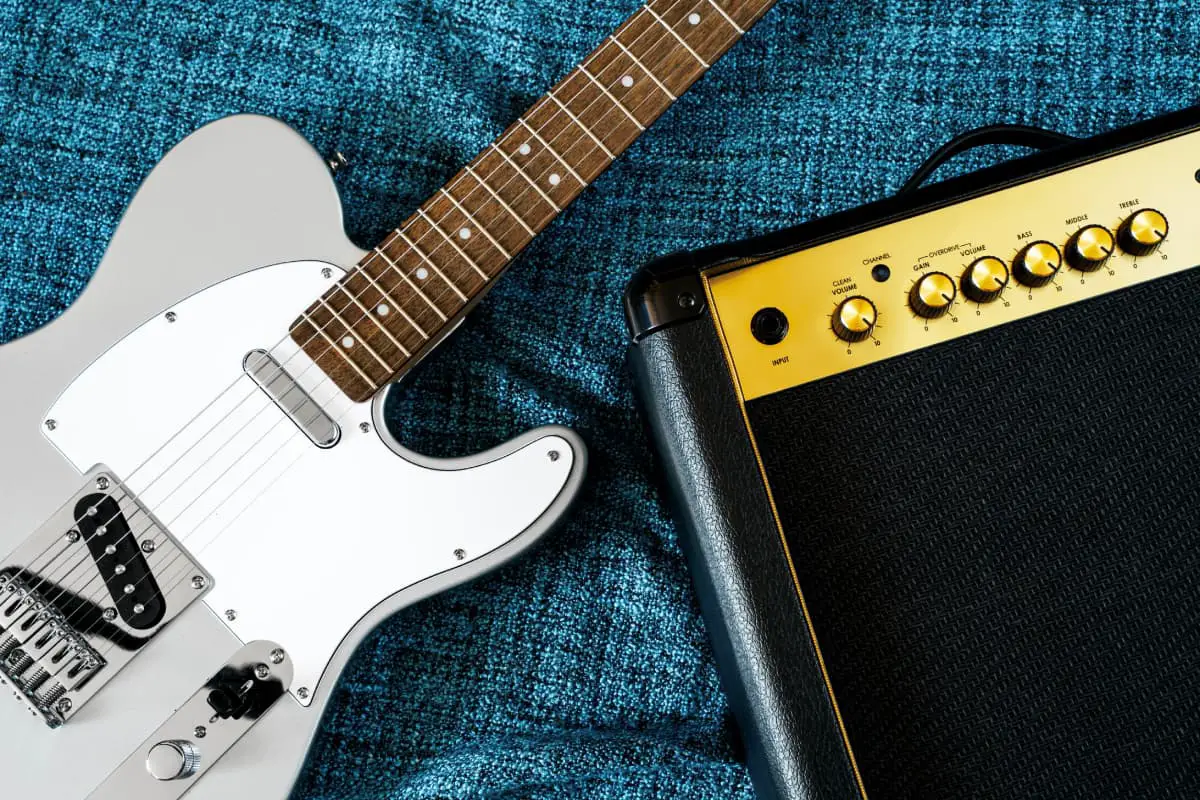When it comes to playing guitar music, there are many factors to take into consideration. From choosing an amp and guitar to checking the strings and tuning your guitar, there’s a lot you need to know to get the best sound from your instrument.
Electric guitar amps are designed to make it easy to replicate common distortion and overdrive effects that squeeze the most out of your electric guitar. On the other hand, acoustic amps produce a cleaner, and more natural-sounding tone. Other differences exist in design and applications.
As you may know, many different kinds of amplifiers are designed specifically for acoustic and electric guitars. This article will discuss some key differences between electric guitar amps and acoustic amps and explore why one is better than the other, depending on your specific circumstances.
👇😀👇NOTE👇😀👇
If you want to find out what my recommended guitar gear is, then here is what I recommend on Amazon:
- Fender Cutaway Acoustic-Electric Guitar Bundle (MY FAVORITE GUITAR)
- Snark SN-8 Super Tight All Instrument Tuner (Easiest Tuner I’ve Used😏)
- 6 String Acoustic Guitar Capo (Best CAPO for quick changes)
- Dunlop Max Grip 1.0mm Nylon Picks (Thick Guitar Pick So You Don’t Lose Grip!)
- Universal Guitar Stand (Cheap & Minimalist Guitar Stand I Recommend)
- Levy’s 2″ Wide Quick Adjust Guitar Strap (Best Guitar Strap For Any Level)
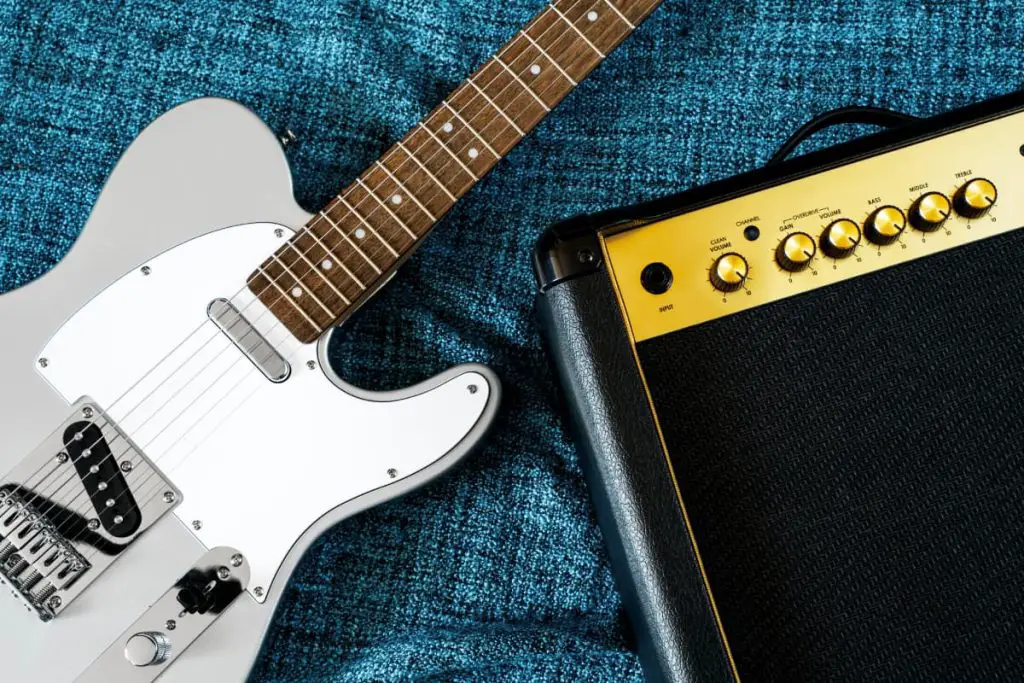
Electric Guitar Amp and Acoustic Guitar Amp Overview
Electric and acoustic guitar amps are essential for most professional guitarists. They are used to amplify the sound of an electric or acoustic guitar so the audience can hear it while playing or recording.
The best guitar amps emphasize your instrument’s natural tone while adding its distinct character and presence. There are many things to consider when buying an electric or acoustic guitar amp, such as:
- How you will be using it
- How large a space you will be playing in
- What kind of music you play, and many other factors
However, before I get into that, here’s a brief overview of both types of guitar amps:
Electric Guitar Amp
An electric guitar amp is an audio device used to amplify an electric guitar’s sound. An electric guitar amp increases the instrument’s volume, enabling the audience to hear it more clearly. The amplifier also lets you add new characteristics to the sound or modify existing characteristics, such as echo and reverb, based on your playing style.
How an Electric Guitar Works
An electric guitar amp has two main functions: signal amplification and tone control. It consists of a speaker (or multiple speakers), a preamplifier, and a power amplifier.
First of all, the signal from the guitar flows into the preamplifier. The preamplifier (or preamp) is a circuit that picks up the guitar signal and bumps it up without changing the signal’s sonic characteristics. By the end of amplification, the idea is to add some juice to the signal before it gets to the power amplifier.
You can add more characteristics to the signal or tweak the existing characteristics at the preamp stage. Most controls, including volume, bass, treble, and mid settings, take effect at the preamp stage and enable you to define what the final output will sound like.
Next, the signal flows into the power amplifier, which adds even more juice to make the signal powerful enough to drive the speakers. Lastly, the speakers take in the powerful signal and play it for the audience.
Pros of an Electric Guitar Amp
- An electric guitar amp is louder and more powerful than an acoustic guitar amp.
- Versatility – You can play just about any genre of music with an electric guitar amp, from rock, death metal, pop, country music, and so much more.
- Customization – Plenty of controls allow you to customize your sound, so it sounds exactly how you want it to.
Cons of an Electric Guitar Amp
- Electric guitar amps are usually more expensive.
- They take up more space and are relatively heavy compared to their acoustic counterparts, making them difficult to lug around wherever you go.
- They are also often louder, making them less suitable for smaller venues than acoustic guitar amps.
Acoustic Guitar Amp
Acoustic guitars are unique instruments in the world of music. They are perfect for playing in smaller spaces or venues without the need for speakers and amps.
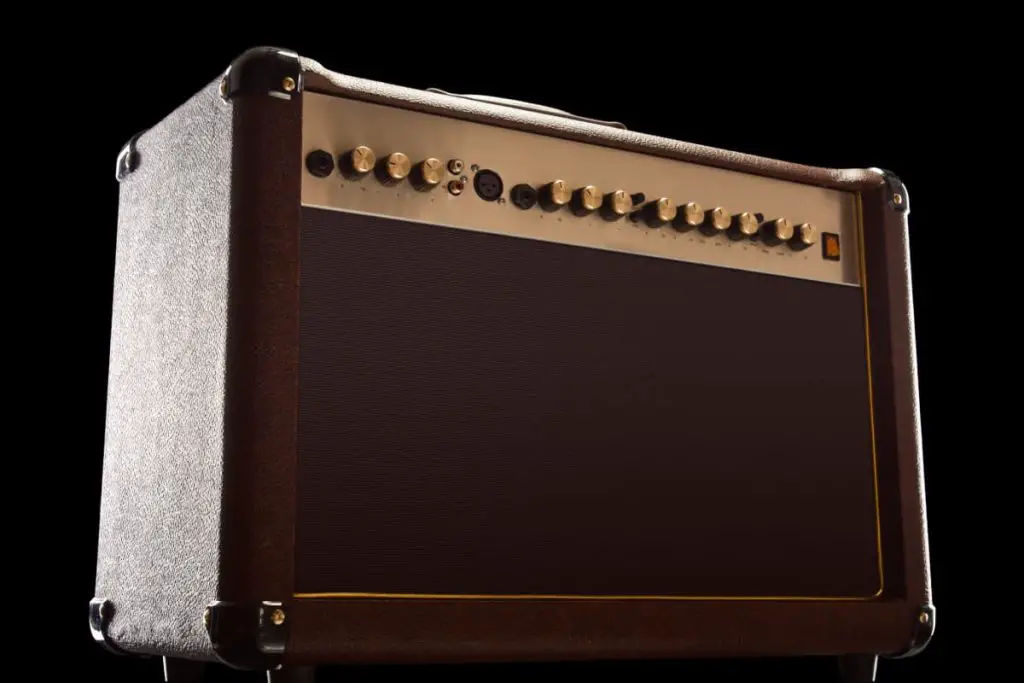
Acoustic guitar amps work in the same way as electric guitar amps. They have the same basic anatomy:
- A preamplifier
- A power amplifier
- A speaker (or multiple speakers)
The only major difference lies in their design and controls. While electric guitar amps may offer more controls, acoustic guitar amps may feature fewer controls to keep the tone of the output as natural as it can be.
However, you’ll find a few additional features unique to the acoustic guitar amp:
- Optimized effects – Acoustic guitar amplification would be pointless if the final output sounded nothing like the original instruments. An acoustic guitar produces thinner, clearer, and brighter sounds that go well with the singer’s vocals. This is why many acoustic guitar amps come with preset EQ and optimized reverb specifically for the acoustic guitar.
- Feedback control – Acoustic guitar amps are known to be noisy and prone to unwanted feedback. Acoustic guitars can produce a high-pitched screeching or howling noise called feedback when amplified. This is caused by the sound of the guitar being picked up by the acoustic feedback and then fed back into the system repeatedly, creating an unpleasant continuous whine.
Feedback control is one of the most important features you’ll find only on the acoustic guitar amp.
Pros Acoustic Guitar Amp
- Acoustic guitar amps are usually less expensive and easier to carry around than electric guitar amps.
- Excellent for playing in small venues or if you’re just starting and you’re looking for a good, affordable amp to start with
Cons Acoustic Guitar Amp
- Not suitable for an electric guitar – Acoustic guitar amps aren’t designed for use with electric guitars, so they won’t produce the same results as a specialized electric guitar amplifier.
- Not suitable for all styles of music – Acoustic guitar amps are best for playing acoustic guitar music; they won’t produce the same results for playing some distortion-demanding rock genres.
Types of Amplifiers Suitable for Electric and Acoustic Guitars
The electric guitar is versatile, and its range of sounds can be further expanded with the right amplifier. There are various types of guitar amps that you can choose from depending on what performance or practice setting you have in mind.
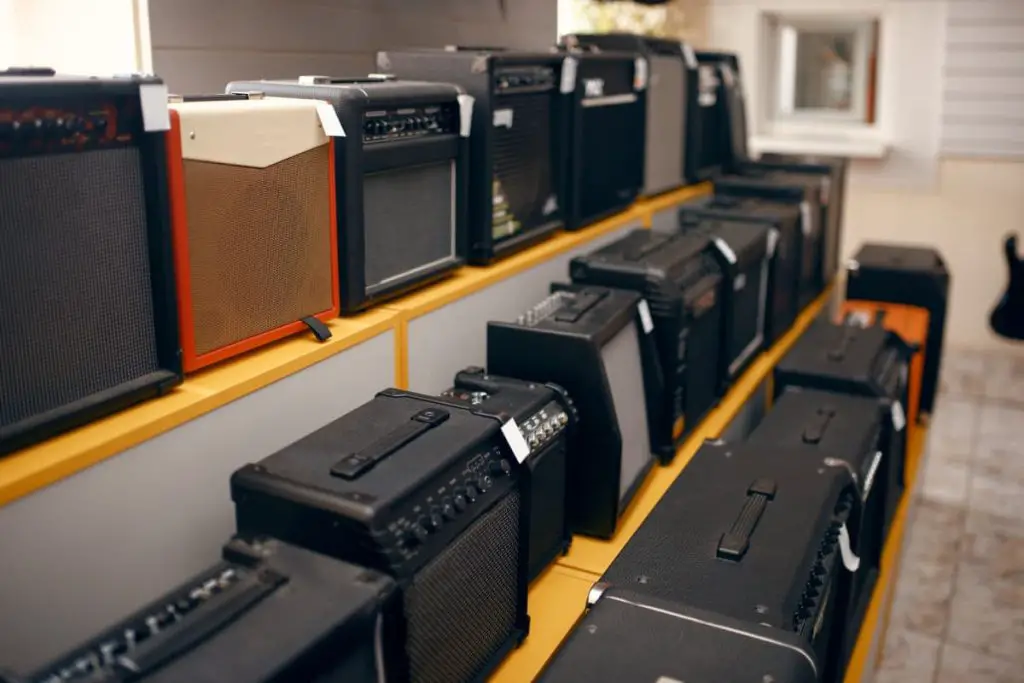
Here’s a brief overview of the types of guitar amplifiers:
- Solid-state amp – A solid-state amp uses integrated circuits, transistors, and diodes to amplify sound. Solid-state amps usually have fewer features than hybrid amps, but they are more affordable and reliable. Solid-state amps are a good choice for beginners because they are easy to use and usually have a simple control panel.
- Tube amp – A tube amp is an amplifier that uses vacuum tubes as its primary amplification source. Tube amps are more expensive than hybrid and solid-state amps, but they are known for their superior sound quality. Compared to solid-state amps, tube amps have a warmer and fuller sound that is ideal for playing a variety of musical genres.
- Hybrid amp – A hybrid amp is an amplifier that uses solid-state and vacuum tubes. Hybrid amps often have a wide range of features and can produce diverse sounds that range from clean to distorted. Hybrid amps are reasonably priced, and their versatility makes them a great option for beginners.
- Modeling amp – A modeling amp is different from the other types of guitar amps in that it uses digital modeling technology to simulate the sound of various amplifiers. A modeling amp is a good choice if you want a consistent and predictable sound. It’s also convenient if you frequently switch between different instruments because you can set them to the same settings.
- Combo amps – Combo amps are guitar amps that combine the amplifier and speaker under the same roof. They’re often seen as the entry-level option for guitarists looking to buy an amp, but they have the same wide range of features and sound quality as larger and more complex amps.
- Amp heads and speaker cabinets – If you want more control over your sound, you can get an amp head and pair it with one or more speaker cabinets. Amp heads come with built-in preamps and power amps that amplify the signal. However, they don’t have speakers for the output.
Speaker cabinets come with built-in speakers, but you can also use them with external speakers if you want more volume or a different tone than the internal speakers provide.
All in all, the best electric guitar amp is the one that fits your individual needs and provides the performance you are looking for.
Design Differences
Regarding musical performance, there’s no denying that electric and acoustic guitars have different strengths. While both instruments are incredibly versatile and can be used for various genres and playing styles, each guitar’s design has something to add or subtract from the final output.
These differences in design have to be taken into account.
For starters, electric guitar amps are designed to work mostly with electromagnetic pickups, while acoustic guitar amps are designed to work with many other kinds of acoustic guitar pickups, including:
- Contact pickups
- Soundhole pickups
- Undersaddle piezo transducers
- Internal mics (sound best when combined with any option listed above)
To put things into perspective, an electromagnetic pickup generates a voltage equal to the intensity of your strum. If you hit the strings twice as hard as your normal playing, the electromagnetic pickup generates a voltage that’s twice as much.
Piezo pickups, on the other hand, work exponentially. For instance, if you strike the strings twice as hard, the voltage generated will be four times as high.
Acoustic guitar amps are often accompanied by compression to smoothen the highs, bring up the lows, and stabilize the final output volume. On the other hand, electric guitar amps take up the raw signal from the pickup and allow you to transform it through the controls, namely:
- EQ
- Tone
- Mid
- Bass
- Treble, etc.
Sound Differences
Normally, an acoustic guitar is louder than an electric guitar without amplification. The acoustic guitar amplifies its sound primarily through its hollow body, while an electric guitar relies on amplification through an amplifier or effects to achieve the desired volume.
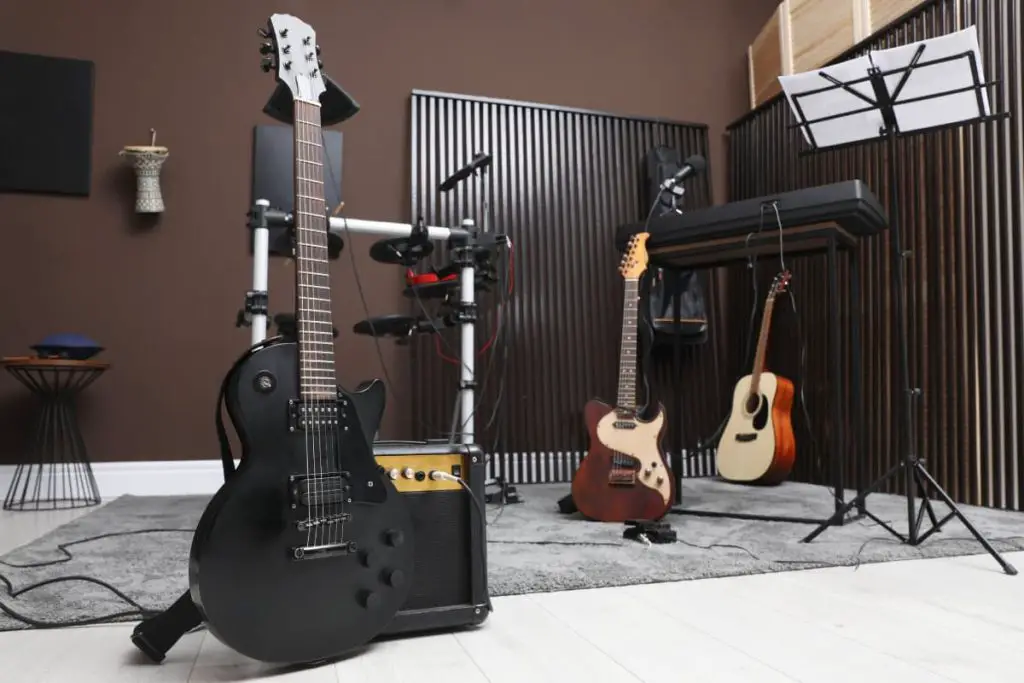
The sound differences between electric and acoustic guitar amplifiers mostly come from the amplification method, i.e., the type of amplifier.
Electric guitars use tubes and solid state amplifiers.
Tube amplifiers are an old-school way of driving speakers that have made a comeback in recent years due to their unique sound profile. A tube amp’s rich overtones, warmth, and dynamic response are perfectly suited to an electric guitar. Another reason why electric guitar amps feature tube technology is distortion but I will discuss this in more detail below.
Acoustic guitars rely heavily on solid-state technology for amplification. Solid-state amps are also limited by their nature.
Transistors, diodes, and other electrical components cannot produce the same warmth as tubes. It also means that they do not distort the same way tube amps do as they get overloaded.
There is no perfect answer for every player and situation when it comes to electric guitar and amp tone. The variety of available sounds exceeds the number of pickup configurations on offer, with players needing to find the right balance between volume, distortion, and tonal complexity for any given recording or performance.
Distortion Differences
If you’re playing an electric guitar, you’ll need an electric guitar amp to get the distorted sound that rock and metal guitarists are known for. Electric guitar amplifiers are designed to introduce the “growl” that makes distorted electric guitar sounds so recognizable, all thanks to the tube amplifiers, two or three speakers, and a powerful amplifier.
Acoustic guitars, on the other hand, do not need distortion. As such, acoustic guitar amplifiers are only designed to replicate the natural sound of an acoustic guitar. Besides, they use solid state amps, which don’t do well when overloaded to produce distorted sounds.
Volume Differences
Another big difference between acoustic and electric guitar amps is the acoustic guitar’s lack of volume for a very large audience. While an acoustic guitar amp is built to enhance the sound of an acoustic instrument, an electric guitar amp has the power to boost the sound of your electric guitar in a fantastic way.
Both types of amps are designed to produce a clean sound with added effects, but some electric guitar amps also come with built-in reverb and chorus effects that enhance the sound further. These are usually loud enough to be used in a small club without needing to connect them to other speakers.
Electric Guitar vs. Acoustic Amp: Which One Is Better?
All in all, there’s no right or wrong choice when you’re deciding between acoustic and electric guitar amps. It all comes down to your individual needs and preferences.
An acoustic guitar amp is best if you’re playing in a small venue with restrictive noise rules. If you’re playing in a larger venue or you’d like to boost the volume of your sound and add a little distortion to it, an electric guitar amp is perfect.
Just remember that although acoustic and electric guitar amps are mostly different in terms of volume, you can use either type of amp to play either type of guitar.
Do Acoustic and Electric Guitars Need Different Amps?
Acoustic and electric guitars have subtle differences in design and construction, which means they respond to different amplification technology.
Acoustic and electric guitars need different amps, but not always. An acoustic guitar amp is designed for use with acoustic guitars, while an electric guitar amp is specifically for electrics. However, if you already have an amp for your guitar, you may use it for your electric and acoustic guitars.

Both types of guitars can also share the same types of effects, although it’s worth noting that each has its own special requirements. If you want to get the most out of your instrument, it’s worth getting an amplifier designed specifically for your guitar.
Remember, acoustic guitars have a natural, unmodified sound. You get a lot of volume from the body. The sound is rich and resonant, with plenty of bass response. Perhaps most importantly is that it’s loud enough so that your audience can hear it when you’re playing, making it perfect for playing without amplification in various locations.
Electric guitars, on the other hand, have the benefit of being able to be plugged directly into an amp.
With an electric guitar, on the other hand, the pickups are what give it its distinctive sound. The body’s shape has almost no effect on the tone, which means that getting enough volume will be challenging. You need an electric guitar amp if you want to play your electric guitar anywhere except your bedroom or practice space.
Pro Tip: Remember these facts before buying an amplifier for your guitar:
- A good amplifier will have a very long lifespan, so you can enjoy playing music for years with it.
- It will also be easy to use and have all the features you need.
- It’s also worth considering how loud the amp will be and how much space it will take up. Some amps are much louder than others, and it’s always best to buy an amp that fits your sound level requirements.
- Lastly, ensure that the amp you choose suits your specific needs. There are many different amp types and models out there, so take some time to find the right one.
Conclusion
Amplifiers are a crucial part of playing the guitar, regardless of the type of guitar you use. A high-quality amplifier will help you to produce better sound and be heard more clearly. It’s also worth keeping in mind that each type of guitar’s requirements will differ, so make sure you choose the right amplifier for each one.
👇😀👇NOTE👇😀👇
If you want to find out what my recommended guitar gear is, then here is what I recommend on Amazon:
- Fender Cutaway Acoustic-Electric Guitar Bundle (MY FAVORITE GUITAR)
- Snark SN-8 Super Tight All Instrument Tuner (Easiest Tuner I’ve Used😏)
- 6 String Acoustic Guitar Capo (Best CAPO for quick changes)
- Dunlop Max Grip 1.0mm Nylon Picks (Thick Guitar Pick So You Don’t Lose Grip!)
- Universal Guitar Stand (Cheap & Minimalist Guitar Stand I Recommend)
- Levy’s 2″ Wide Quick Adjust Guitar Strap (Best Guitar Strap For Any Level)
Related Posts:

